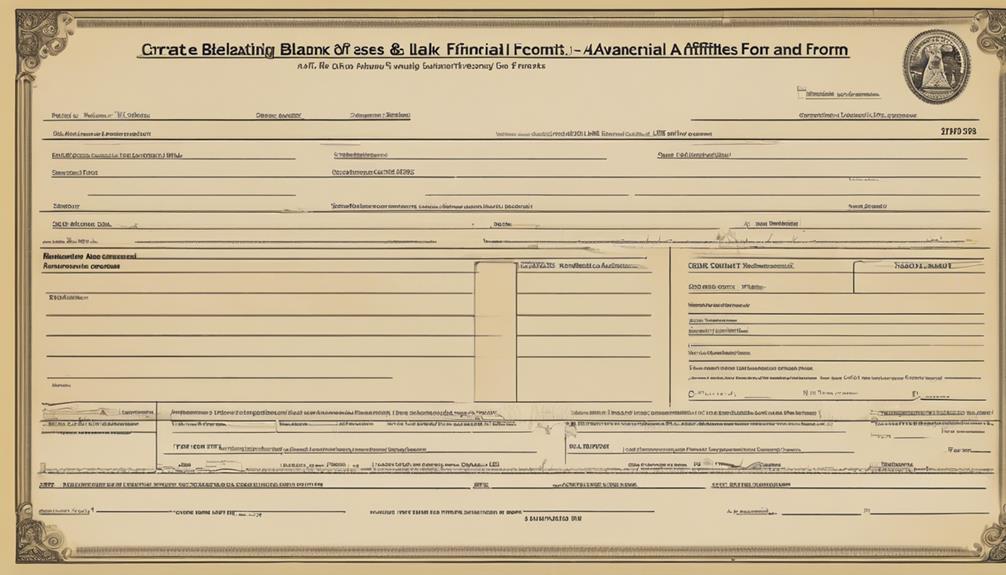During a divorce, many people may not fully understand the significance of a financial affidavit. This document goes beyond just listing numbers; it can impact important decisions during the resolution process. From revealing hidden assets to ensuring fair agreements for spousal and child support, the financial affidavit plays a crucial role.
But, what happens when the information provided isn't entirely accurate? Let's explore the implications and complexities of navigating a divorce through the lens of a financial affidavit.
Key Takeaways
- Financial affidavits outline financial positions crucial for asset division and support arrangements.
- They ensure transparency in disclosing income, expenses, assets, and liabilities.
- Courts heavily rely on accurate affidavits to make informed decisions on property division.
- Complete and accurate affidavits promote fairness, trust, and equitable outcomes in divorce proceedings.
Importance of Financial Affidavit in Divorce
In divorce proceedings, the financial affidavit serves as a critical document that outlines the financial positions of both spouses, guiding decisions on asset division and support arrangements. This document plays a pivotal role in ensuring transparency and accuracy in financial disclosures during divorce proceedings.
Without the submission of a complete and accurate financial affidavit, individuals risk facing unfavorable legal outcomes and penalties. The information provided in the financial affidavit is instrumental in determining asset division, alimony, and child support arrangements. Therefore, it's imperative that the financial affidavit is completed with utmost precision and honesty.
Information Required in Financial Affidavit

Detailed information on income, expenses, assets, and liabilities is essential in a financial affidavit for divorce proceedings. This document typically includes a breakdown of sources of income such as salaries, bonuses, and investments.
Moreover, it outlines regular living expenses to provide a comprehensive view of the financial situation. In terms of liabilities, all debts like loans, credit card balances, and mortgages must be transparently listed in the affidavit.
On the assets side, individuals need to document real estate properties, vehicles, bank accounts, retirement funds, and any business interests they hold. The financial affidavit plays a crucial role in determining financial responsibilities, support payments, and asset division during the divorce process.
Role of Financial Affidavit in Property Division
When preparing for divorce proceedings, the financial affidavit significantly influences the equitable division of marital property by providing a clear snapshot of each spouse's financial situation. The financial affidavit requires detailed information on assets and liabilities, ensuring transparency in the divorce settlement process. By disclosing assets, including properties, investments, and bank accounts, the affidavit helps prevent hiding assets during the division. This document also includes information on outstanding debts and credit statements, giving a comprehensive overview of the financial status of each party. Courts heavily rely on this form to make informed decisions regarding property division, aiming to achieve a fair outcome for both spouses and any children involved. The financial affidavit plays a critical role in ensuring that all financial aspects are considered, leading to a just distribution of assets based on the information provided by each party.
| Financial Affidavit | Role in Property Division | Importance |
|---|---|---|
| Detailed Information on Assets and Liabilities | Ensures transparency | High |
| Disclosure of Credit Statements | Prevents hiding assets | Medium |
| Court Reliance on Affidavit | Informed decisions | High |
Validity and Accuracy of Financial Affidavit

The validity and accuracy of a financial affidavit in divorce proceedings are crucial for ensuring transparency and fairness in the determination of asset division, alimony, and child support. When it comes to financial affidavits, accuracy is key to avoiding legal consequences and ensuring a just outcome. Here are three critical points to consider regarding the validity and accuracy of financial affidavits:
- Complete Disclosure: Providing a comprehensive and truthful account of income, expenses, assets, and liabilities is essential. Any discrepancies or omissions can lead to disputes and unfavorable legal outcomes.
- Trustworthiness: Courts heavily rely on the information presented in financial affidavits to make decisions. Therefore, accuracy and honesty in reporting are fundamental to the integrity of the divorce process.
- Fair Resolution: Accurate financial disclosures pave the way for a smoother and fairer resolution of financial matters in divorce. Transparency in financial affidavits promotes trust and aids in achieving an equitable outcome for all parties involved.
Resolving Disputes Related to Financial Affidavit
Resolving disputes related to financial affidavits in divorce proceedings requires a meticulous examination of the provided information to ensure accuracy and transparency in asset division and settlement outcomes. Divorce attorneys play a crucial role in assisting individuals in navigating these complex financial disclosures. Below is a table outlining key elements that can spark disputes and the importance of addressing them promptly:
| Key Elements | Potential Issues | Importance |
|---|---|---|
| Assets | Undisclosed assets | Proper asset division is essential for a fair settlement. |
| Liabilities | Hidden debts | Full disclosure prevents unfair distribution of liabilities. |
| Income | Inflated or understated income | Accurate income assessment impacts alimony and child support calculations. |
| Expenses | Excessive or omitted expenses | True expenses affect the determination of available funds for support payments. |
Resolving these disputes promptly can prevent legal consequences and ensure a just asset division in the divorce settlement. By addressing discrepancies in financial affidavits, individuals can mitigate challenges and work towards a smoother divorce process.
Frequently Asked Questions
What Is Affidavit in Finance?
In finance, an affidavit is a sworn statement confirming financial details under oath. It covers income, expenses, debts, assets, and liabilities for legal purposes. Accuracy is crucial for legal proceedings like divorce settlements.
What Is an Affidavit of Assets?
An Affidavit of Assets is a legal document that outlines a person's financial holdings like income, expenses, debts, and assets. It plays a crucial role in divorce proceedings to ensure transparency and fair distribution of property and support.
How Long Do You Have to File a Financial Affidavit in Florida?
Quickly file a financial affidavit in Florida within 45 days of initiating divorce proceedings to avoid legal consequences. Accuracy is key to inform court decisions on alimony, child support, and asset division promptly.
How Do I Make an Affidavit of Financial Support?
To make an affidavit of financial support, we gather income documentation, list assets, and draft a formal statement declaring our willingness to financially assist. This process ensures USCIS requirements are met accurately.
What is the significance of a Financial Affidavit in a Divorce?
In an Illinois divorce, a financial affidavit is a crucial document that outlines each party’s financial situation. This includes income, expenses, assets, and debts. By having the Illinois divorce financial affidavit included in the process, it helps ensure transparency and fairness in the division of assets and determination of support payments.
Conclusion
In conclusion, the financial affidavit in a divorce is a critical document that provides a comprehensive overview of one's financial situation during the marriage. It plays a crucial role in determining spousal and child support, property division, and other financial matters.
Like a magnifying glass revealing hidden truths, the financial affidavit ensures transparency and fairness in divorce proceedings. Accuracy and honesty in disclosing financial information are paramount to avoid legal consequences and achieve a favorable outcome in the settlement.










